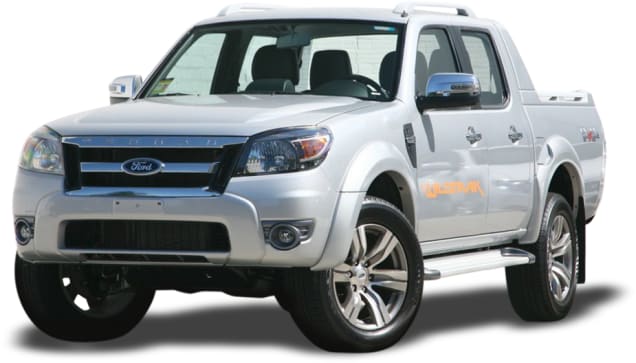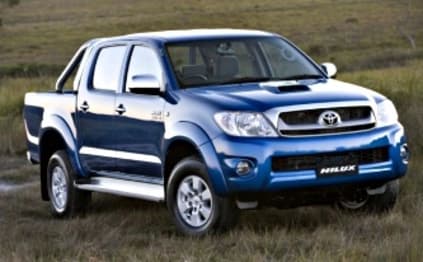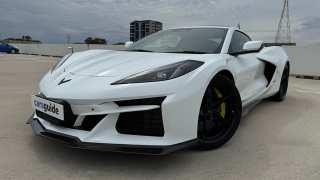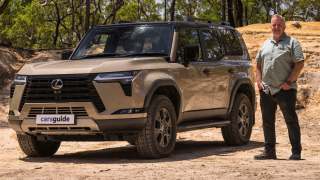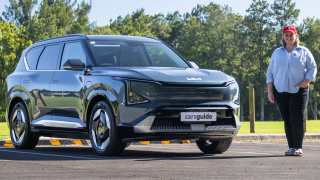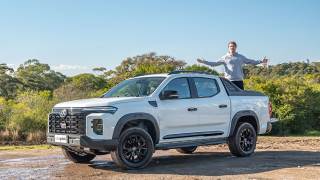
Used Ford Ranger review: 2009-2011
- Ford Ranger
- Ford Ranger 2009
- Ford Ranger 2010
- Ford Ranger 2011
- Ford Ranger Reviews
- Ford Reviews
- Ford Commercial Range
- Ford Ute Range
- Commercial
- Ute
- Ford
- Used Car Reviews
What we like
- Comfort
- Engines
- Cabin ergonomics
What we don't
- Recalls in 2010, 2011 and 2012
- Cruise control issues
- Clutch replacement costs
What we like
- Comfort
- Engines
- Cabin ergonomics
What we don't
- Recalls in 2010, 2011 and 2012
- Cruise control issues
- Clutch replacement costs
Once just a workhorse the humble ute is now called upon to perform all sorts of duties, from traditional worker, to cool sportster, weekend escaper and even family hack.
Where in the past Holden and Ford dominated the market with their locally designed and built Commodore and Falcon-based models, the needs of Australian ute buyers are now well served by a vast array of makes and models.
One of the more popular ones is the Thailand-built Ford Ranger, which has assumed the mantle once worn by the Falcon, itself a descendent of the original Aussie ute.
Models
The PK Ranger was a face-lifted and updated remake of the previous PJ model. It boasted a new, more urbane look, the range of variants was expanded and included a new high-end 'Wildtrack' version, and there were more standard features.
It was available in XL, XLT and Wildtrack forms, with a range of cab-chassis and pick-ups, there was a choice of single-cab, super-cab and dual-cab body styles, all were diesel powered, and there was a choice of rear-wheel drive of four-wheel drive.
The XL was the entry model. It was available as a rear- or four-wheel drive cab-chassis with single, super or dual-cab bodies, or a pick-up, with the choice of rear or four-wheel drive, and single, super or dual-cab bodies.
All were turbo-diesel powered, by either a 2.5-litre or 3.0-litre engine, and depending on the variant a choice of manual gearbox or automatic transmission.
Standard features included dual front airbags, air conditioning, tilt adjustable steering column, MP3 connectivity, two-speaker sound, CD player, remote central locking, cupholders, power front windows and power mirrors, and cloth trim.
Optional extras included ABS braking, bucket front seats, and a tray.
Moving on up to the XLT saw the choices reduced. It was only available as a pick-up, which came as a rear-wheel drive with a dual-cab, or four-wheel drive with super- or dual-cab.
XLT buyers were treated to the additional features of 16-inch alloy wheels, ABS braking, EBD electronic brakeforce distribution, air conditioning, side front airbags, CD stacker, front fog lamps, leather steering wheel and gear knob, flares, and chrome grille, mirrors, and door handles.
Metallic paint was the only option offered.
New to the range in PK was the Wildtrack. It was only available as a dual-cab four-wheel drive pick-up with the 3.0-litre turbo-diesel engine and the choice of manual gearbox of automatic transmission.
Standard were 18-inch alloy wheels, six-speaker sound, CD stacker, air conditioning, fog lamps, illuminated side mirrors, leather steering wheel and gear knob, power front windows, power mirrors, roll bar, roof rails, side steps, sports dials, and suede-look trim. If that wasn’t enough you could also have metallic paint.
While the PK Ranger was well equipped for the day it didn’t have features like Bluetooth to sync an iPhone or Android device, there was no sat nav to find your way about, it didn’t have a touch screen, the air conditioning wasn’t climate control, and there was no sunroof on offer.
Likewise when parking or reversing you couldn’t call on the assistance of a reversing camera, parking sensors and a park assist system.
The spare tyre was a full-sized one.
Cabin
The number of seats in the cabin was dependent on the body chosen.
If you chose the single-cab you got a bench that could accommodate three, but there was also the option of bucket seats, which would limit the seating to two.
The super-cab could accommodate four, two in the front buckets seats, and two in the rear seat.
With bucket front seats and a rear bench for three, it was possible to accommodate five in the dual-cab.
The cabin was neat and tidy, all controls were well within the driver’s reach, and the seats were comfortable and supportive.
There was a footrest for the driver, the steering column could be adjusted for tilt, and there were cupholders in the front.
The XL and XLT had cloth trim; the Wildtrack had suede lookalike inserts in the seats and the doors.

It was too early for ISOFIX baby car seat mounting points.
Engine
Like the previous model there were no petrol engines offered in the PK Ranger; both engines offered were four-cylinder common-rail turbo-diesels.
The base engine was a 2.5-litre double-overhead camshaft, fuel-injected unit that pumped out 105kW and 330Nm when operating at its twin peaks of horsepower and torque.
It was a willing worker, revving smoothly, and pulling readily from low speed.
The 3.0-litre version, standard in the Wildtrack, offered more horsepower and torque, with 115kW at its power peak and 380Nm at maximum torque.
With more torque it was even more willing from low speed and was more flexible than the smaller engine.

The transmission options were a five-speed manual gearbox, or a five-speed automatic transmission, and final drive was either via the rear wheels or all four.
Driving
Utes were once unrefined and uncomfortable, the sort of vehicle a boss would have his workers drive, but wouldn’t drive one himself.
All that has changed, utes like the PK Ranger are much more refined and considerably more comfortable, while still able to get the job done when needed.
With independent front suspension the PK handled well and was quite comfortable to ride in, while the semi-elliptic leaf spring rear suspension carried or towed a workmanlike load.
On the road the performance was smooth and willing, and those inside were treated to a quiet and comfortable ride, with little wind or road noise to disturb the inner calm.
Safety
The PK Ranger was rated at three stars by ANCAP.
All models came with safety features including airbags for the driver and front seat passenger.
The XT and Wildtrack had the most safety features; they too had dual front airbags, but also had side airbags for those in the front seats.
ABS braking was optional on the XL, but standard across the rest of the range.
Any common issues?
Reliability of the PK Ranger is good; there are few problems of note.
Owners of vehicles with the manual gearbox are sometimes surprised to find they have to replace the clutch at relatively low kilometres.
The cost of replacing the clutch can be higher than expected because the dual-mass flywheel is often replaced at the same time.
When checking a Ranger look for damage caused by unthinking and uncaring workers who couldn’t care less about the boss’s vehicle. Also check for signs of off-road abuse.
The Ranger’s warranty was three years/100,000km, but that’s long been expired.
Ford recommended the Ranger be serviced every 15,000km or 12 months, and capped price servicing didn’t apply.
The cost of service isn’t expensive and any experienced mechanic can do it.
A recall in 2010 alerted owners to the possibility of a fatigue crack developing around the bonnet striker when driven for extended periods in tough going. If it did crack the bonnet could come open while driving along.

PK models fitted with cruise control as a genuine Ford accessory were affected by a recall in 2011. Owners could have found problems setting or cancelling the cruise.
There was also a recall on 2012 relating to the potential of a crack developing around the towbar tongue.
MORE: If anything crops up, you’ll probably find it on our Ford Ranger problems page.
Owners view
Len Batson: I’ve been to Cape York in my 2010 XL super-cab towing a 1.5-tonne camper. I can’t fault it; it’s comfortable, reliable and economical.
Ralph Morton: My 2010 XLT dual-cab is the best car I’ve ever owned. I bought it new and have never had to do anything but the regular servicing. It happily tows a 2.6-tonne caravan.
Travis French: I have a 2009 Wildtrack, which is a solid all-round ute. I’ve had one or two problems; I had to replace a rocker cover gasket, and had to replace a clutch at 90,000km. Other than those it’s been good.
Alan Bairstow: My 2009 XL double-cab has done 220,000km, and it has been a joy to own and drive. It’s towed a boat without any problem, it’s been reliable and economical, and is as comfortable as any sedan I’ve been in.
Rivals
Toyota HiLux
Tough, unbreakable, the class leader is hard to beat.
Nissan Navara
Lost in the new-age pack, but it’s a worthy contender.
Mitsubishi Triton
Good all-rounder, but can struggle when worked at the extreme.
Verdict
Reliable, comfortable and economical new-age worker that happily does double-duty at family time.
Pricing guides
Range and Specs
| Vehicle | Specs | Price* | |
|---|---|---|---|
| XL (4X4) | 3.0L, Diesel, 5 SP AUTO | $10,010 – 13,750 | 2009 Ford Ranger 2009 XL (4X4) Pricing and Specs |
| XL (4X2) | 3.0L, Diesel, 5 SP AUTO | $8,470 – 11,990 | 2009 Ford Ranger 2009 XL (4X2) Pricing and Specs |
| XLT (4X2) | 3.0L, Diesel, 5 SP MAN | $9,680 – 13,200 | 2009 Ford Ranger 2009 XLT (4X2) Pricing and Specs |
| XLT (4X4) | 3.0L, Diesel, 5 SP MAN | $13,750 – 18,040 | 2009 Ford Ranger 2009 XLT (4X4) Pricing and Specs |
Other cars to consider
$3,979
Lowest price, based on 45 car listings in the last 6 months







